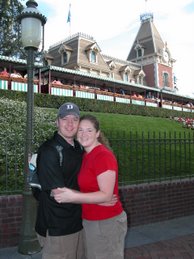
you call him Dr. Jones Doll!!
A Cottrell Family Favorite Since 1983






 The anchor supposedly belongs to the ship of Jean Lafitte, a so-called gentleman pirate who cruised the waters surrounding New Orleans. He disappeared after his ship sunk off the coast of New Orleans after being hit by a hurricane. However there are myths that he did not die and that he used the storm and shipwreck as a chance to escape his criminal past as a slave trader and a pirate. There is a town named after him in Louisianna and the pirates ride starts off in Lafitte's Landing named for the pirate. The last line on the sign is, "don't believe everything you read."
The anchor supposedly belongs to the ship of Jean Lafitte, a so-called gentleman pirate who cruised the waters surrounding New Orleans. He disappeared after his ship sunk off the coast of New Orleans after being hit by a hurricane. However there are myths that he did not die and that he used the storm and shipwreck as a chance to escape his criminal past as a slave trader and a pirate. There is a town named after him in Louisianna and the pirates ride starts off in Lafitte's Landing named for the pirate. The last line on the sign is, "don't believe everything you read."













